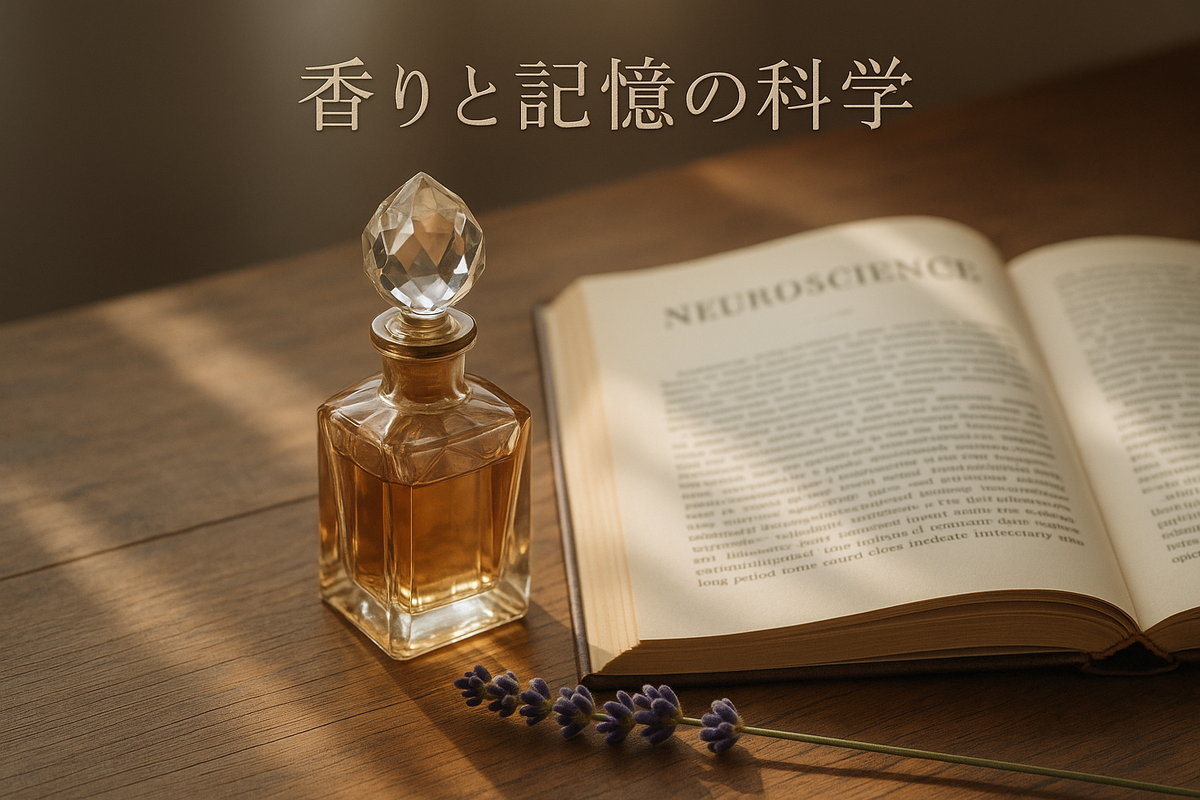Scent and memory: why smells evoke memories
Scent and memory: why smells evoke memories
Have you ever had the experience of a vivid memory coming back to you the moment you smelled a certain scent? The relationship between scent and memory is an interesting phenomenon that has been scientifically proven.
In this article, we will explain in detail why scents are so strongly linked to memories, from the neuroscientific mechanism behind it to how to use them in real life. Let's understand the mysterious power of scent and enjoy a richer perfume experience.
table of contents
- The fundamental relationship between scent and memory
- The scent processing system from a neuroscience perspective
- The scientific explanation for the Proust effect
- Memorable scent characteristics
- How to use scent memory
- The relationship between perfume choice and memory
- Summary: Life's memories colored by scent
The fundamental relationship between scent and memory
The uniqueness of the sense of smell
Compared to the other senses, smell has some unique features:
-
Direct brain transmission
- Information processing that does not go through the neocortex
- Direct connections to brain regions responsible for emotion and memory
- An instinctive reaction without conscious decision
-
A strong connection to memory
- Once a scent memory is formed, it lasts for a long time.
- Particularly strong associations with childhood memories
- Traits stored with emotions
-
The magnitude of individual differences
- Genetic differences in olfactory receptors
- The meaning of scents based on past experiences
- Cultural interpretation of scent
Types of scent memories
Episodic memory
-
Linked to a specific event
- My first love's perfume
- The smell of mother's cooking
- Scent memories from travel destinations
-
Includes time and location information
- Information on "when" and "where"
- Emotional state at the time
- Surrounding circumstances and people
Semantic Memory
-
Knowledge and meaning of scent
- Flower names and scents
- Types and characteristics of perfume
- Cultural meanings of scent
-
Learning to understand scents
- Judging whether a fragrance is good or bad
- Socially acceptable scent
- Choose the right scent for the occasion
Procedural memory
- Scent-related behavior patterns
- How to use perfume and how to adjust the amount
- How to change your mood with scents
The scent processing system from a neuroscience perspective
Olfactory neural circuits
From olfactory reception to recognition
-
Detection by olfactory receptors
- Receptor cells in the olfactory epithelium of the nasal cavity
- Approximately 1,000 types of olfactory receptors
- Specific binding to aroma molecules
-
Information processing in the olfactory bulb
- Transmission from the olfactory nerve to the olfactory bulb
- Early processing and integration of odor information
- Fragrance Identification Using Pattern Recognition
-
Processing in higher brain centers
- Odor recognition in the olfactory cortex
- Memory and emotion processing in the hippocampus and amygdala
- Conscious decisions in the prefrontal cortex
Brain areas involved in memory and emotion
Hippocampus (center of memory)
-
Episodic memory formation
- Temporary storage of new memories
- Transfer to long-term memory
- Integration of spatial and temporal context
-
Linking scents to memories
- Simultaneous recording of scent information and events
- Scent as a search cue
- The relationship between memory recall and scent
Amygdala (emotional center)
-
Formation of emotional memories
- Judging whether something is pleasant or unpleasant
- Emotional memories of fear and joy
- Judging survival importance
-
Emotional responses to scents
- Instinctual likes and dislikes
- Reactivation of past emotional experiences
- Stress and relaxation responses
Anterior cingulate cortex
- Attention and consciousness control
- Integration of emotion and cognition
- Conscious evaluation of scent
Neurotransmitters and scent
Dopamine (reward system)
-
Pleasure and motivation regulation
- Pleasant scent
- Promoting approach behavior to scent
- Memory enhancement
-
Promoting learning and memory
- Reward-induced memory consolidation
- The connection between scent and pleasure
- Formation of conditional learning
Serotonin (mood regulation)
- Peace of mind and happiness
- Stress reduction effect
- Regulation of sleep and wakefulness
Noradrenaline (alertness/attention)
- Adjusting your alertness level
- Improved Attention
- Memory consolidation
The scientific explanation for the Proust effect
What is the Proust effect?
A phenomenon that originates from the novel "In Search of Lost Time" by French author Marcel Proust:
literary background
-
The scent of madeleines brings back memories
- The scent of madeleines soaked in tea
- Vivid recurrence of childhood memories
- A timeless memory experience
-
Evoking memories from the unconscious
- Unintentional resurrection of memories
- The past brought about by the senses
- Recovering memories thought to be lost
Scientific Mechanism
Direct Neural Connections
-
Specialized circuits in the olfactory system
- Sensory information that does not pass through the thalamus
- Direct limbic input
- High-speed information processing
-
Close connection with memory systems
- Direct connection to the hippocampus
- Episodic memory activation
- Context-dependent memory recall
Emotion-tagged memories
-
Giving emotional significance
- Emotional appraisal by the amygdala
- Prioritized storage of memories
- Long-term retention
-
Multimodal memory
- Includes sensory information other than aroma
- Memories of the overall experience
- Reconstructing memories in three dimensions
Experimental proof of the Proust effect
Psychological Experiments
-
Detail of scent-based memories
- Vividness of scent-induced memories
- Comparison with other senses
- Measuring emotional intensity
-
Research on autobiographical memory
- Characteristics of personal memory
- Age effects on scent-related memory
- Cultural influences
Brain imaging studies
- Functional Magnetic Resonance Imaging (fMRI)
- PET (Positron Emission Tomography)
- Electroencephalogram (EEG) Measurement
Memorable scent characteristics
Fragrance chemistry
Volatility and Diffusivity
-
Moderate volatility
- Molecular weight that easily reaches the nasal cavity
- Air Stability
- Perception at the right concentration
-
Molecular structure characteristics
- Affinity with olfactory receptors
- The importance of three-dimensional structure
- Functional group type and arrangement
The superiority of complex aromas
-
Single component vs. multiple components
- The Complexity of Natural Flavors
- Multi-component memory enhancement
- Multi-layered memories with time changes
-
Uniqueness and distinctiveness
- Differentiation from other scents
- Unique scent impression
- Independence in memory
Psychological and cultural factors
Personal meaning
-
The importance of the first experience
- The Power of First Impressions
- The importance of emotional context
- Age-related differences in susceptibility
-
Reinforcement through repeated experiences
- Memory consolidation through repetition
- The relationship between habituation and memory
- Conditioned Responses
Social and cultural background
-
Cultural meanings of scent
- Religious and ritual scents
- Fragrances rooted in food culture
- Links to seasons and events
-
Sharing scents between generations
- Scent traditions within the family
- Collective memory through shared experiences
- Social scent norms
biological factors
Differences in memory with age
-
Characteristics of childhood memories
- The uniqueness of memories from ages 3-7
- The dominance of sensory memory
- Uncritical acceptance
-
Memories of adolescence and adulthood
- Conscious scent choices
- Understanding social meaning
- Using scent as an expression of individuality
Gender differences in scent memory
- The superiority of the female sense of smell
- The relationship between hormones and the sense of smell
- Changes due to pregnancy and childbirth
How to use scent memory
Improved learning and memory
Improve learning efficiency
-
Environment-Dependent Learning
- Unified learning and playback environment
- Recreating context through scent
- Memory retrieval cues
-
Improved concentration
- Rosemary improves cognitive function
- Peppermint's stimulating effect
- Lemon improves attention
Memory consolidation
-
Fragrance exposure during sleep
- Use of scent immediately after learning
- Promoting memory consolidation during sleep
- Improved memory recall the next day
-
Combination with repetitive learning
- Repeated learning with the same scent
- Memory consolidation and consolidation
- Facilitating transfer to long-term memory
Psychological health and wellbeing
Stress Management
-
Relaxation effect
- The calming effects of lavender
- Chamomile for better sleep
- The anti-anxiety effects of ylang-ylang
-
Using positive memories
- Fragrances associated with happy memories
- A scent to restore your confidence
- Motivational scent
emotional regulation
-
Improved mood
- Citrus antidepressants
- Floral for psychological stability
- Woody scent for a calming effect
-
Reprogramming emotional memories
- Neutralizing negative memories
- Connecting with new positive experiences
- Graded emotional conditioning
Relationships and Communication
impression formation
-
Improving first impressions
- A good impression with the right scent
- A memorable and distinctive scent
- Building trust
-
Deepening Relationships
- A shared scent experience
- The meaning of special scents
- Using scents to deepen bonds
Branding and Marketing
- Corporate scent branding
- Scent marketing in stores
- Promoting product memory retention
The relationship between perfume choice and memory
Personal Fragrance History
The history of fragrance
-
Reflecting on life through scent
- Representative fragrances of each era
- Scents associated with important events
- Changes in scent during growth
-
Fragrance identity
- A fragrance that expresses your individuality
- The scent others associate with
- Consistent scent selection
Memory-based perfume selection
-
Nostalgic scent
- A scent that evokes fond memories
- A comforting scent
- A scent that reminds you of home and family
-
Creating new memories
- Fragrance selection for special occasions
- Celebrating a new start
- A fragrance filled with hope for the future
Perfume and emotional memories
Using positive memories
-
Linking to successful experiences
- Scents for important presentations
- Celebrating a promotion or success
- A scent that gives you confidence
-
Memories of a Loving Relationship
- A special scent for your partner
- A scent that expresses family ties
- A shared scent that deepens friendship
The relationship between trauma and scent
-
Dealing with negative memories
- Recognizing Scents to Avoid
- Gradual desensitization
- Overwriting with new good memories
-
Ensuring psychological safety
- A comforting scent
- A protective scent
- Fragrances for self-healing
Scent and memory in Japanese culture
Seasonal sensations and scent memories
In Japanese culture, seasons and scents are closely linked:
The scent of the four seasons
-
The scent of spring
- The scent of cherry blossoms
- The scent of fresh greenery
- The beginning of a new life
-
Scent of Summer
- Wind chimes and fireworks
- Mosquito coils
- Summer festival food stalls
-
Autumn scent
- The sweet scent of osmanthus
- The scent of autumn leaves in the forest
- The joy of harvest
-
Winter scent
- The pure air of snow
- The scent of yuzu bath
- Special scent for the New Year holidays
Ranjatai and the inheritance of memories
Our Ranjatai Eau de Parfum preserves the memory of Japanese fragrance culture in the present day:
- Inheriting Historical Memory : Over 1,200 Years of Fragrant Wood Culture
- Cultural Identity : Japanese Sensitivity to Fragrance
- Contemporary interpretations : new expressions of traditional fragrances
Learn more about Ranjatai Eau de Parfum
Summary: Life's memories colored by scent
Understanding the relationship between scent and memory can help you enjoy perfume more deeply:
The scientific understanding of scent and memory
-
Brain science evidence
- Direct connection between the olfactory and memory centers
- Simultaneous processing of emotions and memories
- Efficient storage in long-term memory
-
Demonstration of the Proust effect
- Vivid recall of memories through scent
- The uniqueness of emotional memory
- Recovering memories from the unconscious
-
Individual differences and cultural influences
- Genetic differences in smell
- The meaning of scent through experience
- The importance of cultural context
Real-life applications
Using the relationship between scent and memory:
- Improve learning efficiency
- Stress Management and Relaxation
- Deepening human relationships
- Self-expression and identity formation
Application to perfume selection
Choosing a perfume based on memory:
- A look back at my personal scent history
- Scent selection for creating new memories
- Taking care of your emotional health
- Expression of Cultural Identity
Scent is more than just a sensory experience; it has the power to enrich our memories, emotions, and life itself. By understanding this mysterious and beautiful relationship and choosing and using perfume more consciously, you can create more beautiful memories in your life.
Related articles
- Fragrance and Psychology: The psychological effects of perfume - A detailed explanation of the psychological effects of fragrance
- What is a Perfume Family: How to Find the Right Fragrance Family for You - A Guide to Choosing a Memorable Scent





![[Sengoku Fragrance] Ranjatai Eau de Parfum 50ml](http://cavto.jp/cdn/shop/files/MG_1544_e13ac5a9-8c72-4da5-8c41-ac687194c31d_300x300.jpg?v=1744864411)